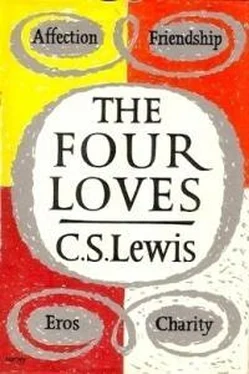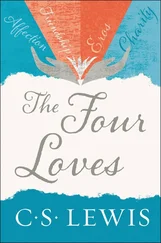"Dogs and cats should always be brought up together," said someone, "it broadens their minds so." Affection broadens ours; of all natural loves it is the most catholic, the least finical, the broadest. The people with whom you are thrown together in the family, the college, the mess, the ship, the religious house, are from this point of view a wider circle than the friends, however numerous, whom you have made for yourself in the outer world. By having a great many friends I do not prove that I have a wide appreciation of human excellence. You might as well say I prove the width of my literary taste by being able to enjoy all the books in my own study. The answer is the same in both cases—"You chose those books. You chose those friends. Of course they suit you." The truly wide taste in reading is that which enables a man to find something for his needs on the sixpenny tray outside any secondhand bookshop. The truly wide taste in humanity will similarly find something to appreciate in the cross–section of humanity whom one has to meet every day. In my experience it is Affection that creates this taste, teaching us first to notice, then to endure, then to smile at, then to enjoy, and finally to appreciate, the people who "happen to be there". Made for us? Thank God, no. They are themselves, odder than you could have believed and worth far more than we guessed.
And now we are drawing near the point of danger. Affection, I have said, gives itself no airs; charity, said St. Paul, is not puffed up. Affection can love the unattractive: God and His saints love the unlovable. Affection "does not expect too much", turns a blind eye to faults, revives easily after quarrels; just so charity suffers long and is kind and forgives. Affection opens our eyes to goodness we could not have seen, or should not have appreciated without it. So does humble sanctity. If we dwelled exclusively on these resemblances we might be led on to believe that this Affection is not simply one of the natural loves but is Love Himself working in our human hearts and fulfilling the law. Were the Victorian novelists right after all? Is love (of this sort) really enough? Are the "domestic affections", when in their best and fullest development, the same thing as the Christian life? The answer to all these questions, I submit, is certainly No.
I do not mean simply that those novelists sometimes wrote as if they had never heard the text about "hating" wife and mother and one's own life also. That of course is true. The rivalry between all natural loves and the love of God is something a Christian dare not forget. God is the great Rival, the ultimate object of human jealousy; that beauty, terrible as the Gorgon's, which may at any moment steal from me—or it seems like stealing to me—my wife's or husband's or daughter's heart. The bitterness of some unbelief, though disguised even from those who feel it as anti–clericalism or hatred of superstition, is really due to this. But I am not at present thinking of that rivalry; we shall have to face it in a later chapter. For the moment our business is more "down to earth".
How many of these "happy homes" really exist? Worse still; are all the unhappy ones unhappy because Affection is absent? I believe not. It can be present, causing the unhappiness. Nearly all the characteristics of this love are ambivalent. They may work for ill as well as for good. By itself, left simply to follow its own bent, it can darken and degrade human life. The debunkers and anti–sentimentalists have not said all the truth about it, but all they have said is true.
Symptomatic of this, perhaps, is the odiousness of nearly all those treacly tunes and saccharine poems in which popular art expresses Affection. They are odious because of their falsity. They represent as a ready–made recipe for bliss (and even for goodness) what is in fact only an opportunity. There is no hint that we shall have to do anything: only let Affection pour over us like a warm shower–bath and all, it is implied, will be well.
Affection, we have seen, includes both Need–love and Gift–love. I begin with the Need—our craving for the Affection of others.
Now there is a clear reason why this craving, of all love–cravings, easily becomes the most unreasonable. I have said that almost anyone may be the object of Affection. Yes; and almost everyone expects to be. The egregious Mr. Pontifex in The Way of all Flesh is outraged to discover that his son does not love him; it is "unnatural" for a boy not to love his own father. It never occurs to him to ask whether, since the first day the boy can remember, he has ever done or said anything that could excite love. Similarly, at the beginning of King Lear the hero is shown as a very unlovable old man devoured with a ravenous appetite for Affection. I am driven to literary examples because you, the reader, and I, do not live in the same neighbourhood; if we did, there would unfortunately be no difficulty about replacing them with examples from real life. The thing happens every day. And we can see why. We all know that we must do something, if not to merit, at least to attract, erotic love or friendship. But Affection is often assumed to be provided, ready made, by nature; "built–in", "laid–on", "on the house". We have a right to expect it. If the others do not give it, they are "unnatural".
This assumption is no doubt the distortion of a truth. Much has been "built–in". Because we are a mammalian species, instinct will provide at least some degree, often a high one, of maternal love. Because we are a social species familiar association provides a milieu in which, if all goes well, Affection will arise and grow strong without demanding any very shining qualities in its objects. If it is given us it will not necessarily be given us on our merits; we may get it with very little trouble. From a dim perception of the truth (many are loved with Affection far beyond their deserts) Mr. Pontifex draws the ludicrous conclusion, "Therefore I, without desert, have a right to it." It is as if, on a far higher plane, we argued that because no man by merit has a right to the Grace of God, I, having no merit, am entitled to it. There is no question or rights in either case. What we have is not "a right to expect" but a "reasonable expectation" of being loved by our intimates if we, and they, are more or less ordinary people. But we may not be. We may be intolerable. If we are, "nature" will work against us. For the very same conditions of intimacy which make Affection possible also—and no less naturally—make possible a peculiarly incurable distaste; a hatred as immemorial, constant, unemphatic, almost at times unconscious, as the corresponding form of love. Siegfried, in the opera, could not remember a time before every shuffle, mutter, and fidget of his dwarfish foster–father had become odious. We never catch this kind of hatred, any more than Affection, at the moment of its beginning. It was always there before. Notice that old is a term of wearied loathing as well as of endearment: "at his old tricks," "in his old way," "the same old thing."
It would be absurd to say that Lear is lacking in Affection. In so far as Affection is Need–love he is half–crazy with it. Unless, in his own way, he loved his daughters he would not so desperately desire their love. The most unlovable parent (or child) may be full of such ravenous love. But it works to their own misery and everyone else's. The situation becomes suffocating. If people are already unlovable a continual demand on their part (as of right) to be loved—their manifest sense of injury, their reproaches, whether loud and clamorous or merely implicit in every look and gesture of resentful self–pity—produce in us a sense of guilt (they are intended to do so) for a fault we could not have avoided and cannot cease to commit. They seal up the very fountain for which they are thirsty. If ever, at some favoured moment, any germ of Affection for them stirs in us, their demand for more and still more, petrifies us again. And of course such people always desire the same proof of our love; we are to join their side, to hear and share their grievance against someone else. If my boy really loved me he would see how selfish his father is … if my brother loved me he would make a party with me against my sister … if you loved me you wouldn't let me be treated like this …
Читать дальше











